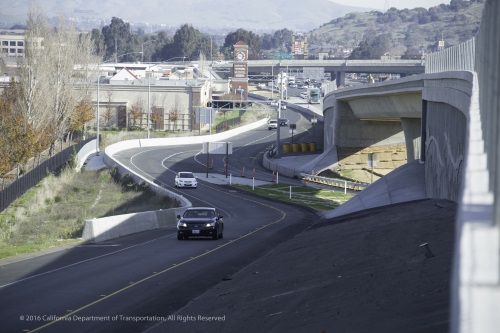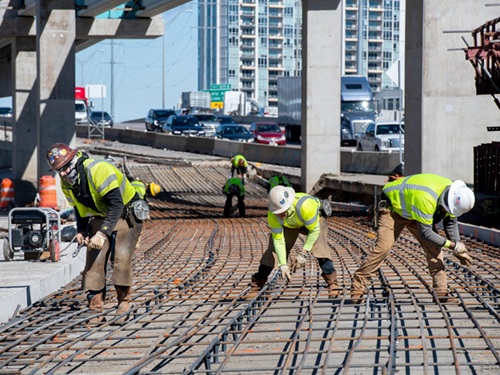Nine major transportation funding-related ballot initiatives were placed before voters in eight states on Nov. 6 – two of them in Colorado alone – and once the votes were tallied, five of those ballot initiatives failed while four of them succeeded.
[Above photo by Caltrans.]
Yet one of those “failures” regarded an effort to repeal California’s Senate Bill 1 or SB 1 that boosted taxes on diesel and gasoline, along with other fees, back in 2017. Not only did California voters nix that repeal effort, leaving SB1 in place, one of the architects of the bill’s passage, Sabrina Cervantes, was poised to win re-election at press time – albeit narrowly.

Based on a state-by-state breakdown compiled by the Council of State Governments, California’s Proposition 6 aimed to repeal SB 1, which increased the base excise tax on gasoline by 12 cents per gallon, the base excise tax for diesel fuel by 20 cents per gallon, and also created an annual vehicle registration fee – ranging from $25 to $175, depending on the value of the car – and a fee for zero-emission vehicles beginning July 2020. SB1 is estimated to raise $5.4 billion annually during the next decade to pay for state and local transportation projects. The effort to repeal it, and to require voter approval for future fuel tax increases and fee hikes, failed by a vote of 55.34 percent to 44.66 percent.

Meanwhile, Missouri voters pondered Proposition D, which would have increased fuel taxes by 10 cents per gallon. The subsequent revenue generated by that tax hike would have been dedicated to the state highway patrol as well as help create a dedicated fund for certain road projects aimed at reducing freight-related traffic bottlenecks. That measure would have also exempt prizes for the Special Olympics, Paralympics and Olympics from state taxes – a measure included because supporters of the fuel tax missed a legal deadline for it to appear on the ballot, while the Olympic prizes tax change was already approved. However, voters rejected the measure 53.84 percent to 46.16 percent.

Further west, in Colorado, two distinct transportation funding plans were on the ballot in Colorado. The first, Proposition 109, would have authorized $3.5 billion in bonds to fund statewide transportation projects, including bridge expansion, construction, maintenance, and repairs, plus require the state to repay the debt from the general fund without raising taxes. Voters rejected that plan by a vote of 61.29 percent to 38.71 percent. Voters also rejected Proposition 110, which would have authorized $6 billion in bonds to fund transportation projects, raise the state sales tax rate to repay the debt, and establish the Transportation Revenue Anticipation Notes Citizen Oversight committee. It failed with ‘NO’ votes at 59.59 percent to ‘YES’ votes at 40.41 percent.
In Connecticut, voters passed a constitutional amendment – Amendment 1 – that prohibited lawmakers from using the state transportation funds for anything other than transportation purposes; essentially creating a “lockbox” for transportation funding. Voters approved that measure by a vote of 88.53 percent to 11.47 percent.

Voters in Louisiana also faced a transportation-related constitutional change, dubbed Amendment 4.
But this time they were voting for a change that ended the dedication of revenue from the Transportation Trust Fund to provide the state police monies for traffic control. Voters approved that cessation of funding 55.94 percent to 44.06 percent.
In Florida, Hillsborough County voters passed Referendum No. 2, which would allow the county to raise the sales tax from 7 percent to 8 percent for 30 years, with those sales tax receipts designated for transportation and road improvements. Voters approved that measure 57.27 percent to 42.73 percent.
In Maine, voters gave the thumbs up to Question 3, which authorized $106 million in general obligation bonds for transportation infrastructure projects. Maine’s voters approved that measure 67.4 percent to 32.6 percent.

Finally, Utah voters considered Nonbinding Opinion Question 1, which would have supported “advising” the state legislature to pass a fuel tax increase of 10 cents per gallon to fund local road construction and maintenance – thereby freeing up additional funding for education. But voters rejected that measure 66.14 percent to 33.86 percent.
Overall, according to post-election analysis by the American Road & Transportation Builders Association’s Transportation Investment Advocacy Center, voters in 31 states approved 272, or 79 percent, of 346 state and local ballot measures aimed at boosting transportation/infrastructure investments. In total, the approved initiatives are expected to generate over $30 billion in one-time and recurring revenue, the group said.



